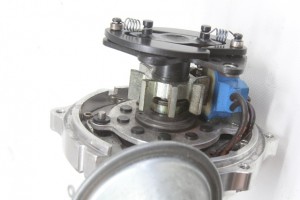I have a question. My 1970 SS Chevelle has a 350 crate motor. When I start the engine now, there is a loud whiney sound coming from my distributor. Is this a bearing maybe or something else? Have you ever had this problem? The distributor is a Mallory 85 series.
Ricky SS
Jeff Smith: Let’s see if we can figure this one out.
The Mallory distributor you are referring to is part of the HEI series. Mallory’s information says this was created with a billet aluminum housing with bushings on both ends of the shaft. So this eliminates bearing noise. You didn’t mention how long you’ve had this distributor, but I’ll assume it has been in the engine for several thousand miles. It is possible that the bushings may experience excessive wear, which would introduce distributor shaft run-out. This should not create a vibration noise, but it could cause the shaft and the reluctor to move laterally and hit the pickup in the distributor.

This is a photo of the magnetic pickup and reluctor on an MSD that would be similar to your Mallory unit. If the bushings in the distributor are worn, then the reluctor could be striking the pickup. Eventually this will cause the distributor to fail.
I’ve included a photo of an MSD distributor showing the 8-point reluctor located on the distributor shaft that spins next to a magnetic pickup. As you can see, there is only a very small gap between the reluctor and the pickup. If the bushing was worn excessively, this would allow the points on the reluctor to strike the pickup–which could make that sound you are hearing. The simple check for this is to remove the distributor cap and rotor and look inside the pickup area for damage to the pickup or reluctor points. Also, grab the distributor shaft and see if you can move it from side to side. If so, this could be the cause of the noise.
To follow this up, removing the distributor from the engine will allow you to judge whether there is lateral (sideways) movement in the distributor shaft. Likely, if the lower bushing is bad, both bushings may be worn. Removing the distributor is the best way to determine if at least the distributor will spin properly without making noise. Another option is to borrow a similar distributor, replace yours with the new one and see if the noise continues. If the noise continues, they at least you know it’s not the distributor.
It’s also a good idea to inspect the distributor gear for undue wear. If the teeth on the gear look sharp, then the gear is worn. The bad news is that likely this same pattern will be reproduced on the camshaft. The only repair for a worn distributor drive gear on a cam is to replace the cam. I don’t think that’s the problem, but it’s worth investigating.
If you find a problem with the distributor, there’s yet another hoop you may have to jump through. Earlier this year, MSD bought the ACCEL Performance Group, which included the Mallory product line. As of March 31st, MSD discontinued the Mallory ignition line. MSD will continue to sell replacement parts such as caps, rotors, modules, gears, and curve kits, but will no longer be offering any other replacement parts. On the Mallory website, the FAQ page lists a toll free number (800-246-0270) you can call if your distributor is damaged. If you send the distributor in (you must first obtain a Return Merchandise Authorization – RMA – number), MSD will give you a free estimate of what it would cost to repair the distributor should it need service. Here is the link for MSD’s return policy form.

I have a knocking noise. I have been told it was a pulley and belt problem. I was later told it was a rod . I still suspect the knocking is a distributor bearing or worn distributor? It never starts when first starting but builds up. Sometimes louder than other, and the knocking can become really loud. The engine loses power at times when moving from a standstill or accelerating.
I have a honda crx v tech 1992 with the 160 hp i notise a sound coming from the distrubiter i cant understand if its metal noise from some part inside or is electricity noise i take off the plastic cap i see the cap looks fine the rotor look old its sharp so i will replace it but all look correct nothing is off place or not stable any idea what happens i also want to notice the car drive fine didnt cut power acceleration is fine but the noise is louder when the car warm up thanks for any ideas
Hello I just changed the distributor in mind 98 Chevy c 1500 and runs fun until you give it acceleration using passing gear and you hear some kind of whining or vacuum week or some weird noise anybody know what that might be?
So, does the noise occur with engine speed or wheel speed? Can you replicate it while the truck isn’t moving? Is it just a noise or does performance suffer too? Regardless, I think you’re on the right track, check all vacuum lines, but you might also want to inspect the distributor gear and see if there’s excessive play in the shaft.